
People Are Calling Out The 40-Hour Work Week After Woman Shares Exactly How We Ended Up Here
As writer Annie Dillard said, “How we spend our days is, of course, how we spend our lives.” However, whether or not we can customize them entirely how we want is up for debate.
The average person will spend 90,000 hours at work over a lifetime. But according to TikTok user ‘Debate Her,’ this goes against our design.
In one of her recent videos, the self-proclaimed reformist explained how she thinks we got to this huge number and why it’s bigger than it should be.
If you’re feeling burned out and tired all the time, it might not be a you problem
Image credits: Nataliya Vaitkevich (not the actual photo)
Afer a TikTok user addressed the 40-hour workweek
Image credits: debateher
Another one, who goes on the platform by the nickname ‘Debate Her’, jumped into the conversation, explaining how we got here
“No, but seriously, it’s 2023 and humans are working more today than they ever have in history. So how did we get here? Great question. I would love to tell you because no, you’re not lazy, you’re overworked and we were never meant to live this way.
For 95% of human history up until about the 1600s, humans worked on average 4-6 hours a day for maybe 42% – 50% of the days of the year.”
Image credits: debateher
“Work was done leisurely and self-paced and long breaks for food, naps, and avoiding the hottest hours of the day was expected and the norm. These patterns are so prevalent across cultures, it’s believed that this is the natural working rhythm that humans prefer.
What changed? How did we go from working a few hours a day less than half of the days of the year to this? Well, a few things. It was a series of changes made by capitalists for capitalists to slowly push the tolerance of workers to get us to where we are. Starting with clocks.
Gone were the days of showing up to work when you were ready, instead you’re expected to be there at a set time.”
Image credits: cottonbro studio (not the actual photo)
“Now, at first, workers didn’t comply to this so the capitalists worked hand in hand with the government to make being late to work a punishable crime. So after that forced compliance was upheld, the boundaries were pushed a little further.
Standardized and significantly reduced break times, less and less holidays and instead of having a few weeks off multiple times a year, most employees now maybe got a vacation right around Christmas.
The traditional public school model that we were all raised in was literally designed to create obedient workers who wouldn’t question how much freedom they have. It only took a few generations for humans to go from working as needed to working long hours with short breaks most of the year.”
Image credits: Tima Miroshnichenko (not the actual photo)
“No time for rest, for hobbies, for your family, nothing. Profit margins and GDP skyrocketed but workers were making less than ever before.
This trend of a few capitalists at the top working hand in hand with the government to slowly milk as much labor out of the population as possible, while cutting costs as much as possible, just compounded year after year.
Meanwhile, corporate consolidation ensured that fewer and fewer people actually reaped the benefits of capitalism. Leading us to where we are today.
Where we’re in the richest society has ever been but the wealth inequality is so great that the majority of us are barely scraping by.”
The clip has been viewed over 2 million times
@debateher#stitch with @BeevesOfTime #capitalism#anticapitalism#overworked♬ original sound – Debate Her
The roots of these arguments can be found in sociologist Juliet Schor’s book The Overworked American
Content creator ‘Debate Her’ is continuing the thoughts of Juliet Schor, a Professor of Sociology at Boston College, who explained in her 1991 book The Overworked American: The Unexpected Decline of Leisure, that the average American in 1987 was working about 1,949 hours annually, while an adult male peasant in 13th-century England racked up approximately 1,620 hours yearly.
“One of capitalism’s most durable myths is that it has reduced human toil,” Schor wrote. “This myth is typically defended by a comparison of the modern forty-hour week with its seventy- or eighty-hour counterpart in the nineteenth century.”
“The implicit — but rarely articulated — assumption is that the eighty-hour standard has prevailed for centuries. The comparison conjures up the dreary life of medieval peasants, toiling steadily from dawn to dusk. We are asked to imagine the journeyman artisan in a cold, damp garret, rising even before the sun, laboring by candlelight late into the night.”
Image credits: Jonny Gios (not the actual photo)
However, Schor argues that these images are backward projections of modern work patterns and that they are false.
“Before capitalism, most people did not work very long hours at all. The tempo of life was slow, even leisurely; the pace of work relaxed. Our ancestors may not have been rich, but they had an abundance of leisure. When capitalism raised their incomes, it also took away their time. Indeed, there is good reason to believe that working hours in the mid-nineteenth century constituted the most prodigious work effort in the entire history of humankind.”
However, some people oppose this view
Tim Worstall, who is a Senior Fellow at a think tank called the Adam Smith Institute, rejects this thinking.
“What Shor (and others, for there are others who make the same claim) has done is looked at the labor service expected of the villein and then claimed that this was the amount of work they had to do,” he said. “Nonsense: this work on the lord’s demesne was the rent payable for the peasant’s own land to farm. Something which rather added to his workload, of course, that of farming his own land.”
Image credits: jesse orrico (not the actual photo)
“We might also point to the amount of household labor that had to be performed. Yarn had to be spun, cloth to be weaved,” Worstall continued. “Cooking was over open fires: and that firewood had to be collected. Bread baked and so on and on.”
“There was a recent report (rather exaggerated but still) which claimed that in the 1930s it took 65 hours of human labor a week to run a household. Today it takes 3. Things were [even] worse back in medieval days.”
And finally, according to Worstall, there’s the fact that these villeins and churls were animal-owning peasant farmers. “People who own animals just don’t get 70 days off a year, you don’t manage to go off … for a week and then expect to have live animals when you come back,” he said.
The researcher argues that Schor and others mistake work in the market economy for all the work being done. “They’ve decided not to include that back-breaking labor done inside the household as labor.”
Either way, the TikTok clip has ignited a heated discussion on the modern workday
This is just so much b******t. I stopped reading when I got as far as "we're working more today than ever before in history". Yeah, no.
I almost stopped at the picture, "hey boomers do you know how old the 40 hour work week is?...", then came the working more elephant dung. Where the heck was this TikTok idiot educated?
Load More Replies...This TikToker is sooooo ignorant, we work now less, then workers in 19th or 18th centuries (they worked 60-90 hours a week). Or does she mean "work hours" of hunters-gatherers? Or time before the industrial revolution? Well, peasants still had to work from dawn till dusk. And I don't think she really wants to go back to good old 15th century. She doesn't like capitalism? I'm pretty sure she wouldn't like feudalism either.
In the 15th century 'peasants' did not work from dusk till dawn every day of the year. They celebrated holy days, and there were a lot of holy days to celebrate. Those were days they did not work. They had long working days preparing the land for sowing, and during harvesting. The rest of the year they did not work from dusk till dawn. The problem in the USA nowadays is the lack of unions. Unions do a lot to better the circumstances of employees. But then again, unions are 'socialistic', so akin to satanic according to many Americans.
Load More Replies..."For 95% of human history up until about the 1600s, humans worked on average 4-6 hours a day for maybe 42% – 50% of the days of the year.” As someone with a background in both history and archaeology: no. Honestly, just no. There's a very common quote floating around about how in the stone age, people only worked 20 hours a week to provide all their basic needs, and the rest was play time. That idea actually started from a university archaeology class in England back in the late 60s, early 70s that came to this conclusion after, essentially, a long camping trip in which all things were new, made in advance, and food was brought to them. I'm of the opinion it just an excuse to go camping for a bit.
This is just so much b******t. I stopped reading when I got as far as "we're working more today than ever before in history". Yeah, no.
I almost stopped at the picture, "hey boomers do you know how old the 40 hour work week is?...", then came the working more elephant dung. Where the heck was this TikTok idiot educated?
Load More Replies...This TikToker is sooooo ignorant, we work now less, then workers in 19th or 18th centuries (they worked 60-90 hours a week). Or does she mean "work hours" of hunters-gatherers? Or time before the industrial revolution? Well, peasants still had to work from dawn till dusk. And I don't think she really wants to go back to good old 15th century. She doesn't like capitalism? I'm pretty sure she wouldn't like feudalism either.
In the 15th century 'peasants' did not work from dusk till dawn every day of the year. They celebrated holy days, and there were a lot of holy days to celebrate. Those were days they did not work. They had long working days preparing the land for sowing, and during harvesting. The rest of the year they did not work from dusk till dawn. The problem in the USA nowadays is the lack of unions. Unions do a lot to better the circumstances of employees. But then again, unions are 'socialistic', so akin to satanic according to many Americans.
Load More Replies..."For 95% of human history up until about the 1600s, humans worked on average 4-6 hours a day for maybe 42% – 50% of the days of the year.” As someone with a background in both history and archaeology: no. Honestly, just no. There's a very common quote floating around about how in the stone age, people only worked 20 hours a week to provide all their basic needs, and the rest was play time. That idea actually started from a university archaeology class in England back in the late 60s, early 70s that came to this conclusion after, essentially, a long camping trip in which all things were new, made in advance, and food was brought to them. I'm of the opinion it just an excuse to go camping for a bit.

 Dark Mode
Dark Mode 

 No fees, cancel anytime
No fees, cancel anytime 











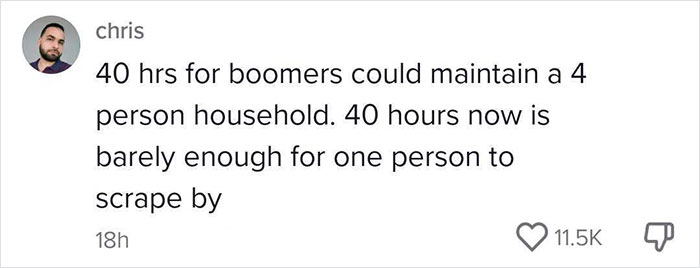



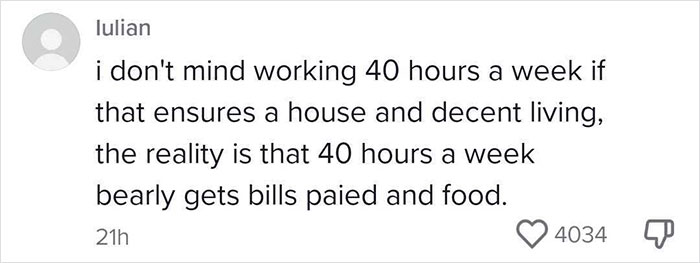
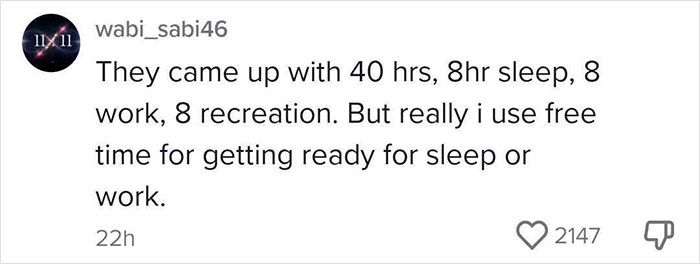
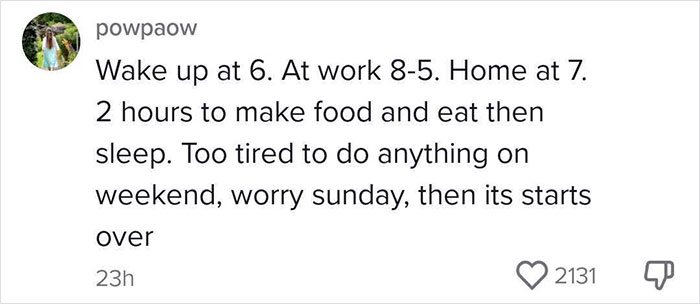




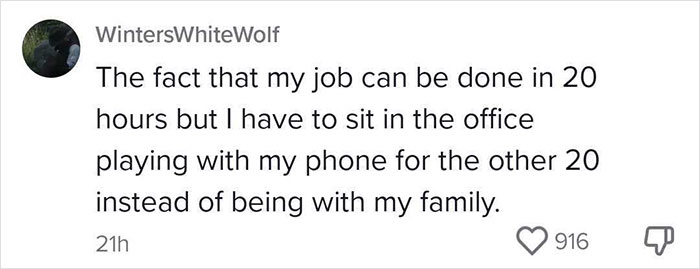
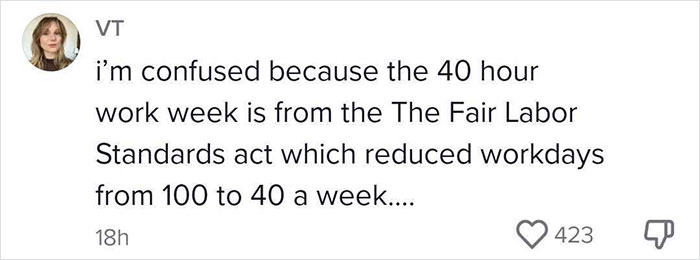











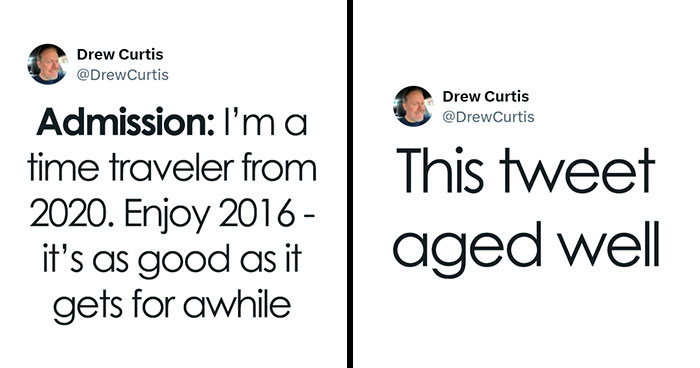
































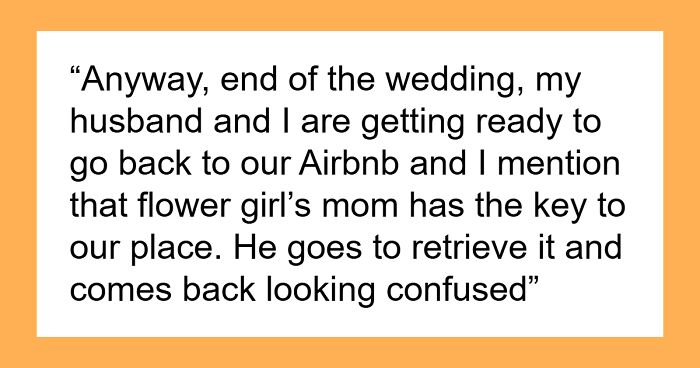


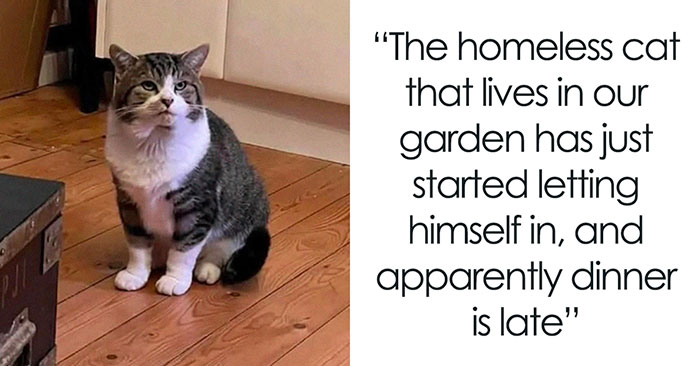

-12
40